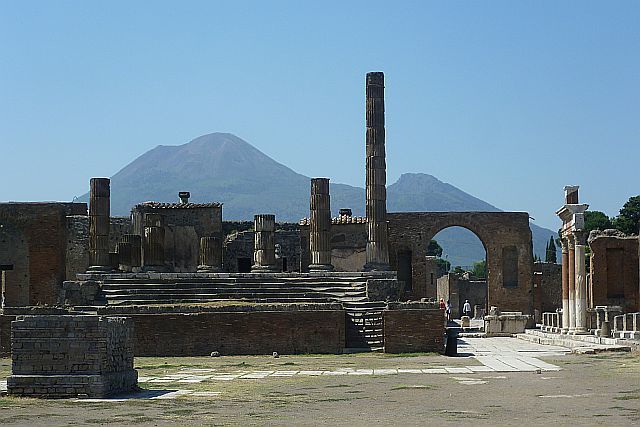During the First Century, war and illnesses were common killers in the Roman Empire. However, in the year 79 CE, Mount Vesuvius would show the city of Pompeii that a natural disaster could bring as much devastation and destruction as anything else.
In the decades before Mount Vesuvius engulfed Pompeii in ashes, an earthquake had struck the region. While the earthquake did not devastate the region, people there did not comprehend the amount of death and destruction that a natural disaster was capable of. In 79 CE, the beautiful and thriving city of Pompeii in the Roman Empire was a popular location for the wealthy and merchants to flock to. Historians have placed the population of Pompeii and neighboring region between 10,000 and 20,000 people. 1 Unfortunately, in the month of August, the city of Pompeii would be transformed from a jewel to ruins by one of the most powerful and devastating natural forces: a volcanic eruption.

Although nature provided warning signs of the catastrophic event that would soon follow, people were not able to comprehend them. Animals were dying because of their lungs being filled with toxic gas, a strong odor filled the countryside of Pompeii, and worse of all, earthquakes rattled the ground below as a result of the pressure from the magma.
On the morning of August 24, 79 CE, a strong blast from Mount Vesuvius that resulted in smoke arising from the crater drew people’s attention to the volcano, but the people of Pompeii did not panic or evacuate. Worse was yet to come. Around noon, the second explosion took place. This explosion was much stronger. A mushroom cloud shot into the sky at a distance of 27 miles. The explosion was estimated to be 100,000 times stronger than the bomb dropped on Hiroshima.2
The eruption that caused the mushroom cloud was so strong that it could have been witnessed hundreds of miles away. Pliny the Younger, an eyewitness, was so horrified and amazed by the cloud that he could not help but describe it in awe:
A cloud, from which mountain was uncertain, at this distance (but it was found afterwards to come from Mount Vesuvius), was ascending, the appearance of which I cannot give you a more exact description of than by likening it to that of a pine-tree, for it shot up to a great height in the form of a very tall trunk, which spread itself out at the top into a sort of branch.3
For those who decided not to flee Pompeii in the wake of the eruption, death was almost certain. As the eruption lasted a day, every passing hour meant more ash and toxic gas. If somehow people managed to survive breathing the toxic gas, the volcanic ashes were sure to kill them. Since structures in Pompeii were not built to carry as much weight as the ash covering them, many structures collapsed, resulting in the deaths of people who found refuge in them.
By the time Mount Vesuvius stopped ejecting ash and toxic gas into the air, ash covered Pompeii. The entire city of Pompeii was gone. What once was a vibrant city was reduced to a pile of ash. In fact, to this day a third of the city remains in ash. Although Mount Vesuvius has not erupted since 1944, an eruption is imminent; hopefully the destruction of the next eruption will not be as severe as the one in 79 CE.
- Encyclopedia Britannica, September 2016, s.v. “Pompeii Ancient City, Italy,” by Wilhelmia Feemster Jashemski. ↵
- Encyclopedia Britannica, September 2016, s.v. “Pompeii Ancient City, Italy,” by Wilhelmia Feemster Jashemski. ↵
- Charles W. Eloit, The Harvard Classics Volume 9 (New York: P.F. Collier & Son. 1909-10), 285. ↵



68 comments
Antonio Coffee
As a kid, I had heard the story of Pompeii and it was always really interested in it. I actually got the chance to visit it one time and was stunned by what I saw there. This article really interested me and helped me to get a greater understanding of this story. The comparison to the bomb dropped on Hiroshima helped to put how devastating this explosion was into perspective. It helped me understand how powerful and destructive nature can be.
Bictor Martinez
It is unfortunate for the great city of Pompeii to be turned from a jewel into ruins. It was sad to read that thus city was becoming so great, that a lot of wealthy people decided to transfer over to Pompeii. That first earthquake should have been a wake up call for those in Pompeii, but I understand they had no idea how devastating a volcanic eruption can be compared to a earthquake. I wish to see the city of Pompeii before the volcanic eruption and just imagine what could of been.
Valeria Perez
I never imagined that a volcanic eruption could be 100,000 times more powerful than the atomic bomb dropped in Hiroshima. As I read the last sentence in the article I could not help and just think, “I really hope that doesn’t happen in my lifetime.” I have seen pictures of the people who were trapped by the lava and it is horrible to see so many faces in agony. This just shows us how we should never ignore the signs of Mother Nature.
Yadira Chavez
The story of Pompeii is unique and really scary if you think about it. I can’t believe people were able to ignore all of the warning signs of the eruption. I know that I would have left after the first earthquake, because the thought of dying the way so many did is terrifying. It’s like a final destination movie.
Yadira Chavez
The story of Pompeii is unique and really scary if you think about it. I can’t believe people were able to ignore all of the warning signs of the eruption and even after the eruption started. I know that I would have left after the first earthquake, because the thought of dying the way so many did is terrifying. It’s like a final destination movie.
Esperanza Rojas
This article was very interesting to read and also well written. The event was very devastating and, to know that they suffered different deaths, such as being crushed, not being able to breathe or maybe being burned to death. I wonder, if the event didn’t happen, how would Pompeii look now, thousands of years later. I was surprised at the quote given, it’s amazing how someone from hundreds of miles away could see something like that happen.
Rebecca Campos
The story of Pompeii is definitely a tragic one. It was unfortunate that the people of Pompeii suffered the pain that they did, especially that they had done nothing to deserve the demise that they met. I wish the article had gone a little more in depth about the the progressions of the eruption, but the overall article was very informative. Pompeii was a terrifying event and hopefully no human will have to endure something like it ever again.
Emily Jensen
The destruction of Pompeii was, and still is, an interest to me. I used to constantly read books and watch documentaries about the warnings the citizens of Pompeii ignored, like the minor earthquakes before the eruption. The fact that people stayed even after the eruption had begun astonishes me, I would have booked it. A great article, very fun read!!
Alexandra Cantu
Ive heard many stories of Pompeii but its always hard to remember everything. This was a great article to refresh my memory. So many people, animals and places were destroyed. It’s crazy that the people of Pompeii did not want to evacuate the city . There was so much ash after the eruption it was cry. This was such an unfortunate event and many many lives were lost but the people should have evacuated once they saw signs of danger.
Caroline Bush
Interesting article! I have always found the topic of the destruction of Pompeii to be interesting and the way this article laid it out was great. Its crazy to think that the people of Pompeii never saw the signs and didn’t evacuate. Its also tragic because so many people lost their lives and they never even saw it coming. I could not imagine being placed in that situation, the terror those people must have faced is insane to think about. I really enjoyed the picture of modern day Mount Vesuvius, it really adds to the depth of the article. Overall I really enjoyed this article and found the topic to be very interesting.